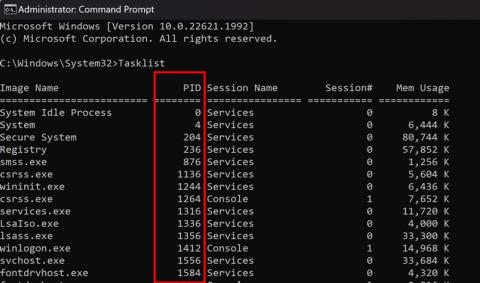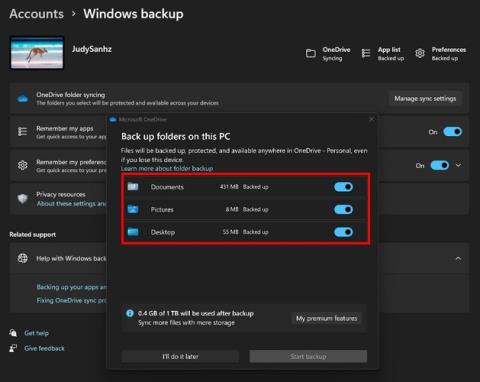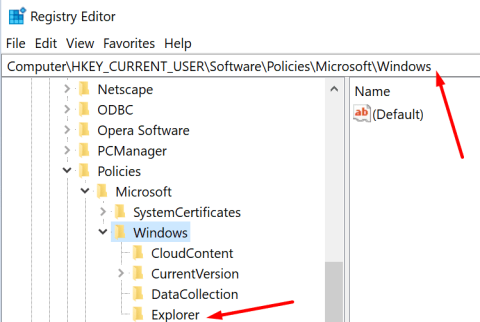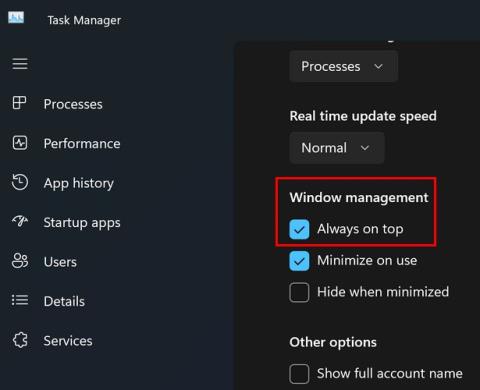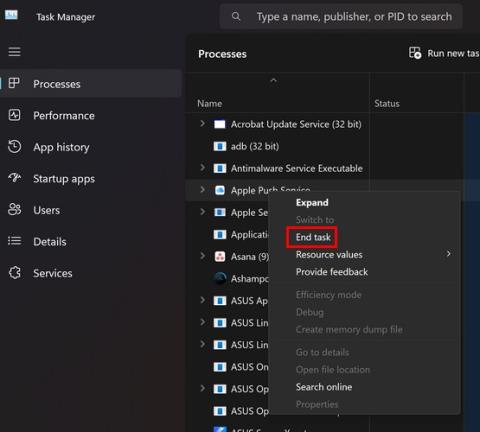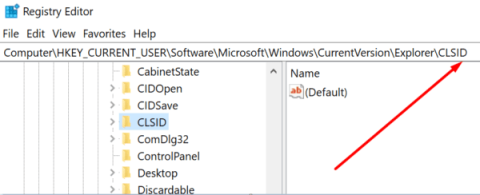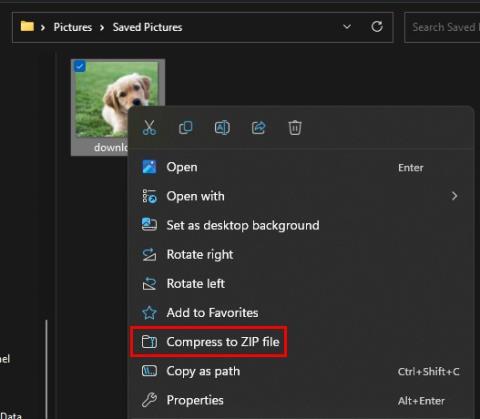Restablecer sempre foi unha graza salvadora cando Windows ten problemas, xa sexan BSOD ou conflitos de controladores. Restablecer Windows pode axudarche a comezar desde cero mentres te devolves á configuración de fábrica e instálase o programa orixinal, se o desexa. Restablecer o teu PC en Windows 11 é bastante sinxelo, pero os erros aos que te enfrontas moitas veces poden dificultar o acceso ao teu escritorio. Se tes problemas deste tipo, sempre podes tentar restablecer o sistema operativo usando a guía CMD que aparece a continuación e comezar de cero de novo. Incluso podes escoller conservar os teus datos ou eliminalos por completo. Use a seguinte guía para restablecer facilmente o seu PC dependendo dos seus requisitos actuais.
Contidos
Restablece o teu PC desde Configuración
Use a seguinte guía para restablecer o seu PC desde a aplicación Configuración do seu PC. Non obstante, se o teu escritorio está actualmente inaccesible debido a BSOD ou máis, podes usar a guía a continuación para restablecer o teu PC desde un USB/ISO.
Preme "Windows + I" no teu teclado para abrir a aplicación Configuración. Agora toca e selecciona "Actualizar e seguranza" na parte inferior.
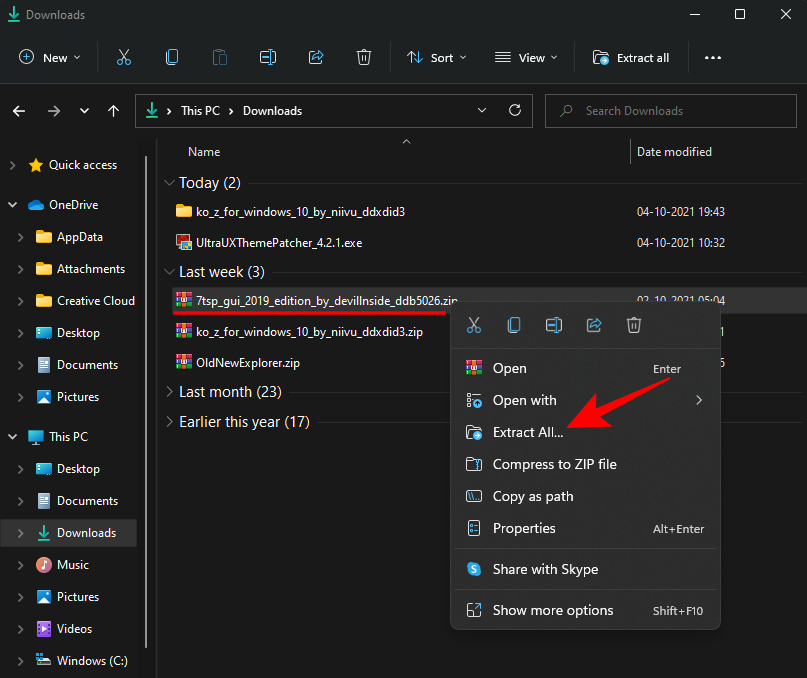
Fai clic e selecciona "Recuperación" á túa esquerda.
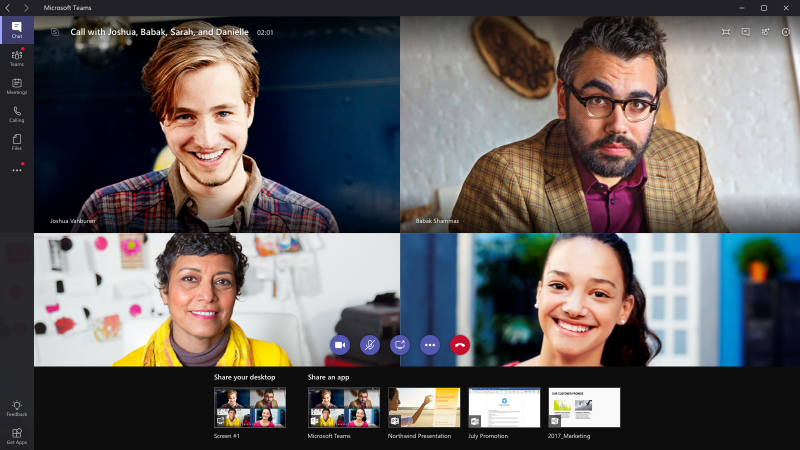
Agora fai clic en "Reiniciar PC" á túa dereita.
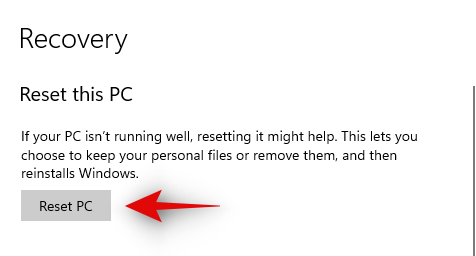
Agora podes escoller unha das seguintes opcións dependendo das túas necesidades actuais.
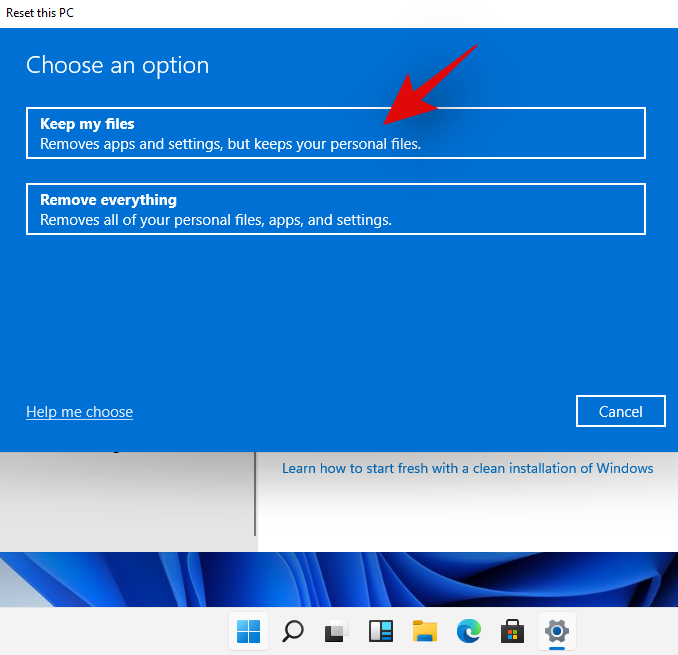
- Conservar os meus ficheiros: eliminaranse todas as aplicacións e servizos de terceiros instalados, pero os ficheiros persoais conservaranse no teu disco duro.
- Eliminar todo: isto eliminará todos os servizos das aplicacións, ficheiros, ficheiros persoais e moito máis do teu sistema.
Unha vez escollido, utiliza unha das opcións seguintes para restablecer o teu PC.
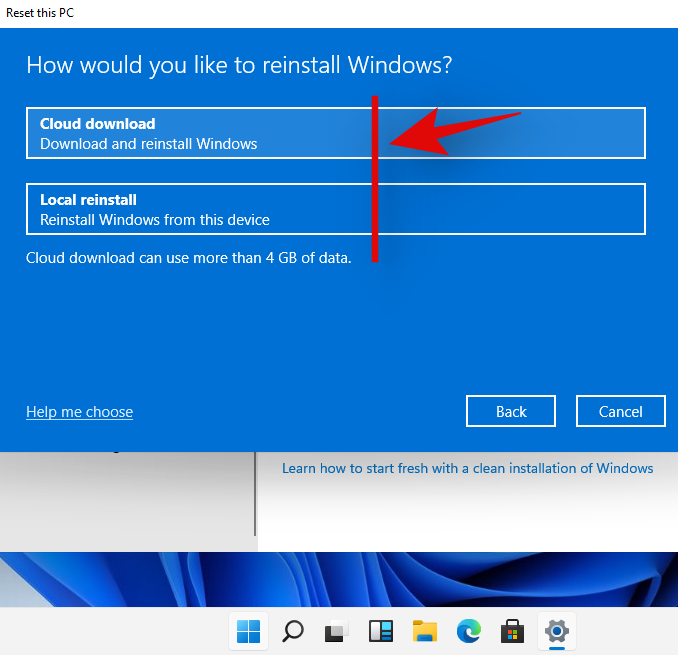
- Descarga na nube: Windows descargará e instalará a última versión do seu sistema operativo no teu sistema. Necesitarás unha conexión de rede para esta opción.
- Reinstalación local: Windows usará ficheiros de recuperación na súa partición de recuperación para reinstalar o sistema operativo e devolvelo á configuración predeterminada de fábrica.
Fai clic en "Seguinte" na esquina inferior dereita.
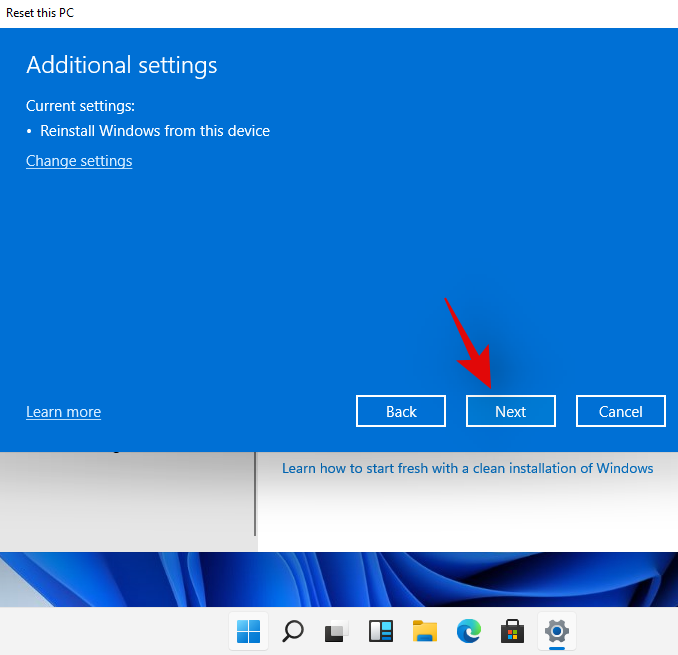
Windows agora reunirá todos os ficheiros necesarios para este proceso. Se escolleu descargar Windows na nube, o ficheiro ISO necesario agora descargarase no seu sistema. Unha vez que pases á páxina seguinte, Windows indicarache que está "Listo para reiniciar este PC". Fai clic en "Reiniciar".
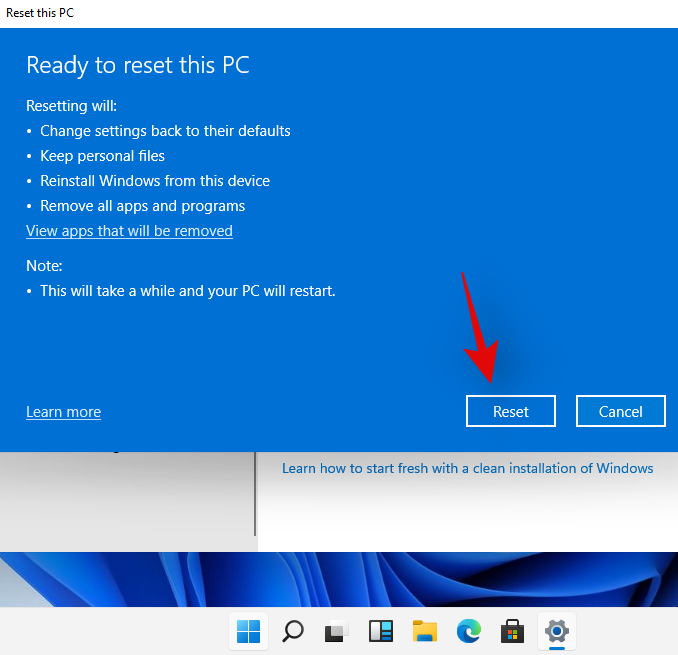
O proceso de restablecemento comezará agora e o teu PC pode reiniciarse por si só varias veces durante este proceso. Recomendamos deixar isto só ata que volvas acceder ao Windows 11 OOBE.
Use unha ISO para restablecer o seu PC
Se tes problemas de ficheiros corruptos ou BSOD, é probable que non poidas acceder ao teu escritorio. Non temas, nestes casos podes usar un Windows 10 ou 11 ISO e restablecer o teu PC desde unha unidade USB. Non obstante, primeiro terás que crear un USB de arranque antes de poder restablecer o teu PC usando este método. Siga a guía a continuación para comezar.
Crea unha unidade de arranque
Necesitará software de terceiros para crear unha unidade de arranque. Usaremos Rufus para esta guía que se pode descargar na seguinte ligazón. Siga a guía para crear un USB de arranque desde o seu Windows 11 ISO.
Obrigatorio
Guía
Descarga e inicia Rufus no teu dispositivo. Unha vez iniciado, fai clic en "Dispositivo" na parte superior e selecciona a túa unidade USB.
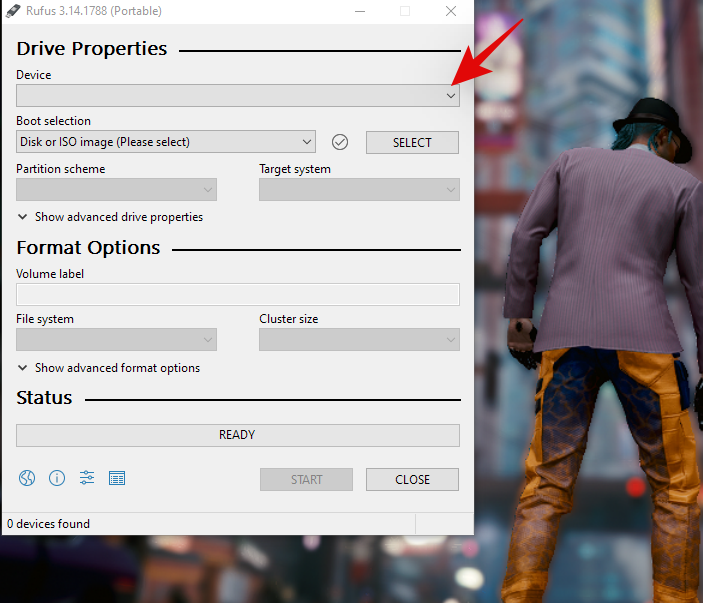
Fai clic en "SELECT" debaixo dela.
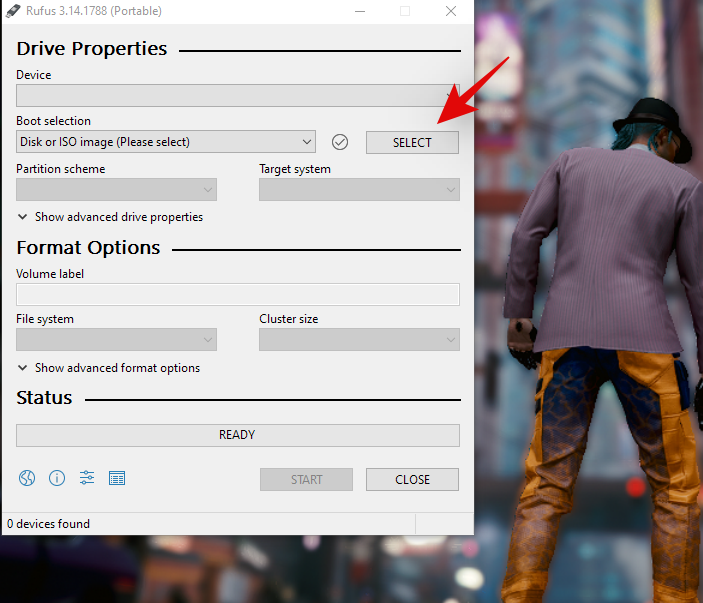
Agora busca e selecciona a ISO de Windows 11 do teu almacenamento local. Unha vez seleccionado, Rufus identificará automaticamente a ISO e cubrirá os detalles necesarios. Unha vez completado este proceso, fai clic en "Inicio" na parte inferior da pantalla.
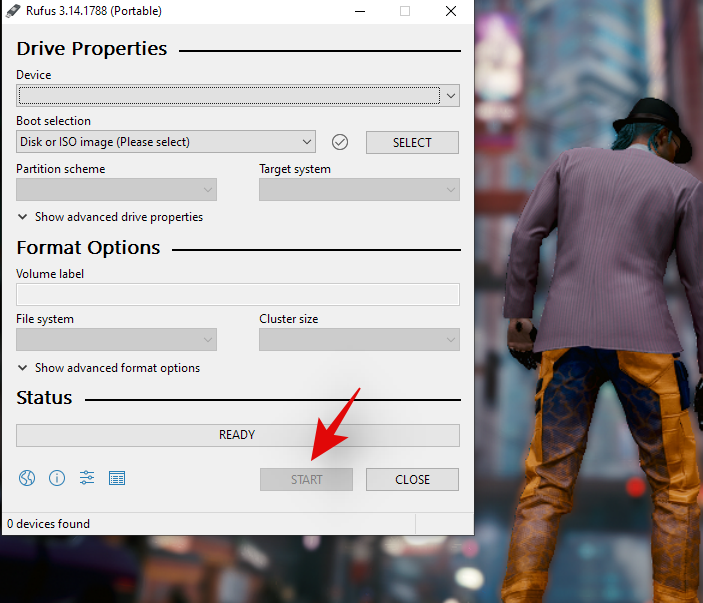
Rufus agora comezará a crear o seu USB de arranque. Unha vez finalizado o proceso, pode pechar o programa e expulsar o USB do seu sistema como faría normalmente.
Restablece o teu PC
Conecta o USB de arranque que acabamos de crear no teu sistema e acéndeo. No caso de que estea activado, reinicie o sistema. Preme calquera tecla cando se lle solicite para entrar na configuración de Windows unha vez que se detecte o teu USB.
Agora recibirache a pantalla de instalación de Windows 11. Fai clic en "Seguinte" na pantalla de selección de idioma.
Agora fai clic en "Reparar o meu ordenador" na esquina inferior esquerda da xanela.
Seleccione "Solucionar problemas".
Agora fai clic en "Recuperar dunha unidade".
Seleccione a súa unidade USB de inicio desta lista e siga as instrucións que aparecen na pantalla para restablecer o seu PC.
Restablecemento de fábrica desde CMD
Se por algún motivo non podes acceder ao escritorio ou acceder á túa unidade, podes usar CMD para restablecer directamente o teu PC. Use a seguinte guía para restablecer o seu PC usando o método CMD desexado.
Activar a xanela de restablecemento desde CMD
Podes activar o tradicional cadro de diálogo Restablecer Windows 11 desde CMD no caso de que todo funcione no teu sistema Windows. Despois podes usar a túa caixa de diálogo e a guía da parte superior para restablecer facilmente o teu PC. Use a guía a continuación para comezar.
Fai clic na icona "Buscar" na barra de tarefas e busca "CMD". Tamén podes premer "Windows + S" no teu teclado para abrir a busca.
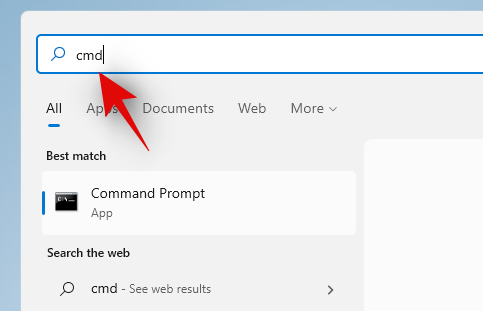
Fai clic en "Executar como administrador" á túa dereita.
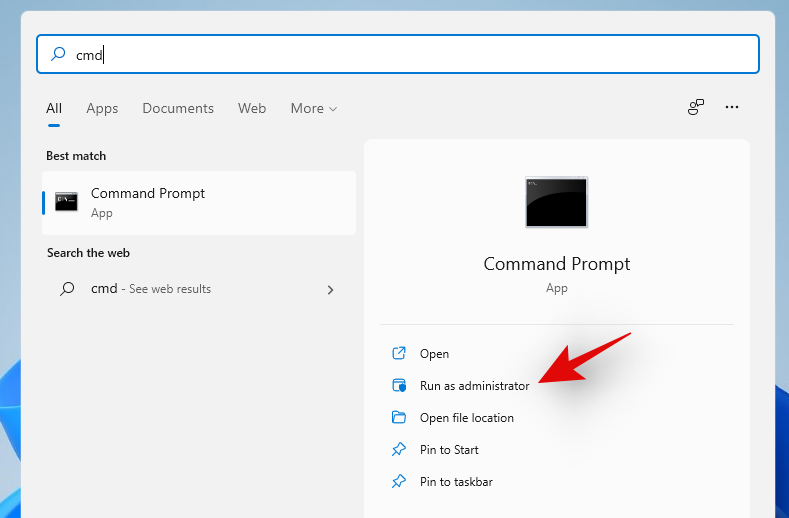
Once the command window opens up, type in the command below and hit ‘Enter’ on your keyboard.
systemreset -factoryreset
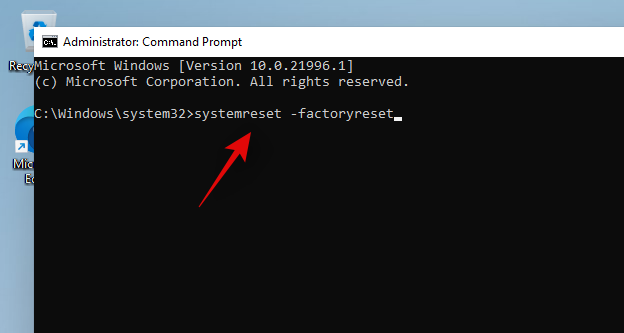
And that’s it! You should now find the traditional reset window on your screen and you can use the on-screen instructions or the guide at the top to reset your PC now. \
Use CMD to completely reset your system
If you can not launch Windows 11 or get to your desktop, then you can use the guide below to launch CMD from your recovery disk and then reset your PC. Follow the guide below to get started.
Boot from your recovery device in your system. Once at the install screen, press ‘Shift+F10’ on your keyboard to bring up CMD.
You will likely be in the ‘X:’ directory as you are booting from a recovery drive. Type in the following command to switch to your boot drive.
C:;
Now type in the command below to reset your system.
systemreset
You can now follow the on-screen instructions to reset your system.
How to factory reset Windows 11 without losing data
You can easily factory reset Windows 11 without losing data as long as you can bring up the Reset dialog box. You can use any one of the guides above to reset your PC normally and simply choose ‘Keep my files’ during the start. This will prompt Windows 11 to leave your personal files and data alone while resetting your PC. Your custom settings will also be restored, once the Reset process has been completed. Please keep in mind that no third-party apps will be saved this way. However, Windows 11 will provide you with a list of all the removed apps and programs once the Reset is completed, on your desktop.
How to factory reset Windows 11 without installation media
If you do not have any installation media, then you can use our first two guides to easily reset your PC. However, if you are facing BSODs then we recommend you try booting your PC in Safe mode. You can then reset your PC from the safe mode by either using the Settings app or by using the CMD. However, if for some reason, you are unable to access the safe mode as well, then we recommend using CMD in the Troubleshoot windows section to reset your PC. Lastly, if that too seems to fail for you then it likely means that your installation is seriously corrupted. In such cases, you will need external installation media and sadly there’s no other workaround that you can use in this case.
How to factory reset Windows 11 without a password
Sadly, if you’ve forgotten your password then you will have to get rid of your data as well when resetting your PC. Windows data is encrypted through your user account passwords and we would highly recommend that you try and recover your password before deleting all your data. However, if you are unable to recover your data then please select ‘Remove everything’ when resetting your PC to delete all files and start over again. If you had signed in with a Microsoft account and not a local account then you can easily reset your password. However, if you had a local account, then it is going to be slightly tough to recover your account.
CHECK
How to factory reset Windows 11 from boot
You can easily factory reset Windows 11 from the boot menu by using a bootable Windows drive. Ideally, this should be a Windows 11 recovery media but a Windows 10 media disk would also work and should help you reset your PC. Once booted to the installation screen, press ‘Shift + F10’ on your keyboard to launch the CMD window. You can then type in ‘C:’ to switch to your boot drive. Once you have switched to your C: drive, you can use the CMD guide above to easily trigger a reset for your PC.
How to format Windows 11
This is an old terminology that usually refers to a fresh install of Windows. You can only format drives in the computer world hence if you format your boot drive then you will have to completely reinstall Windows 11 on your PC again. Many OEMs create necessary partitions on the boot drive that store important data for your system including its serial number, warranty info, Windows license, and much more. A recovery partition also usually exists on the boot drive that helps you reset Windows easily and install factory drivers and more in case of a corrupted install in the future. More importantly, these partitions also contain the necessary drivers for an OOBE on your system without an OS. Hence formatting your boot drive is usually a bad idea unless you know what you are doing. If you still insist on formatting your boot drive, then you can easily do so using any recovery media in your possession. We would recommend using a bootable USB with the Windows 11 ISO. Follow the guide below to get you started.
Plugin your recovery media into your system and power it on. Press any key when prompted to boot from your recovery media.
Note: If your recovery media does not show up during the boot process then you might need to change your boot priority in the BIOS menu.
Once you are at the install screen, select your language and input format and press ‘Next’ once done.
Click on ‘Install Now‘.
Once you are at the next page, press ‘Shift + F10‘ on your keyboard.
Now type in the following command and press ‘Enter’.
Diskpart
Next, type the following command and press ‘Enter’.
List Disk
You will now get a list of all the disks currently available on your system. Note down the name of your boot drive from this list.
Now type in the following command. Replace ‘X’ with the disk number of your boot drive
Select Disk X
The disk will now be selected, you can now delete everything on it using the following command.
Clean
The drive will now be completely wiped and you will need to set it up again. Type in the command below to convert your disk to Gpt.
Convert GPT
And that’s it! You have now formatted your drive. You can now go back to the installation process and create a completely new volume for your new boot drive.
Difference between Reset, Refresh & Format
There are quite a few differences between resetting your PC, refreshing your PC, and formatting your PC altogether. You might be confused between these terms if this is your first time resetting or refreshing your Windows 11. You can use the guide below to easily get familiar with these three terms.
- Reset: Resetting your PC refers to restoring your PC to its original state when it first came out of the factory, with all the intended software that was first installed on your PC. When resetting your PC, you get the option to save your personal files or remove them completely.
- Refresh: Refresh is a term that was introduced in Windows 8 and later incorporated into the Reset option itself. Now the Refresh option exists as a variant of the Reset option. If you decide to keep your personal files when resetting your PC then you are essentially refreshing your PC. Your personal files, factory apps, and your Microsoft store apps will be retained while removing and refreshing everything else.
- Format: Format is a term incorrectly used when referring to a clean Windows reinstall. Format refers to completely formatting your boot drive and then starting from scratch to install a fresh copy of Windows.
Should I reset a laptop?
Yes, you can easily reset your laptop using one of the options above. Resetting your PC is mostly risk-free and should be done in no time if you do everything correctly. Laptops come with a dedicated recovery drive that restores your device to its factory settings and reinstalls all system apps and drivers. Hence do not be afraid, you can easily reset your Windows 11 on your laptop using any of the methods above. You needn’t worry about your Windows license as well, as the reinstallation of Windows 11 will be automatically activated on your laptop using the bundled license at the time of your purchase.
Should I format a laptop?
If you know what you are doing then sure, but for most users, we wouldn’t recommend this. Laptop drivers are hard to source and in many cases, you are solely relying on the OEM for proper drivers. If you end up formatting your drive you will lose your recovery partition as well which means you will need to source your drivers externally every time you reset or reinstall Windows. If you have an old system then you should be extremely careful as after a few years the support site for many laptops is taken down with only a few basic drivers left up on the site to work.
We hope this guide helped you easily reset Windows 11 on your system. If you have any more questions feel free to reach out to us using the comments section below.














